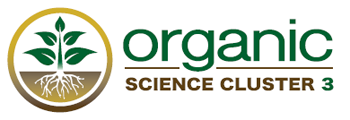Organic Science Cluster III (2018‑2023)
The a (OFC) in collaboration with the Organic Agricultural Centre of Canada (OACC) at ±«Óătv University are pleased to introduce Organic Science Cluster 3 (OSC3): Connecting Environmental Sustainability with the Science of Organic Production.
OSC3 is supported by the AgriScience Program under (an investment by federal, provincial, and territorial governments) and over 70 partners from the agricultural community.
The OSC3 project includes 27 research activities under five themes: field crops, horticulture, pest management, livestock and environment.
Field Crops
- Activity 2 – Development of breeding strategies for organic soybean production systems in Canada.
- Activity 3 – Evaluation of farmer-selected wheat, oat and potato genotypes under organic production in Eastern and Western Canada.
- Activity 4 – Efficacy of using cover crops in 2 of the 3 growing seasons on nitrogen supply in an organic soybean-winter wheat-corn rotation.
- Activity 5 – Organic oat breeding: oat cultivars specifically developed for organic production systems in Canada.
- Activity 6 – Breeding of winter cereals to benefit no-till organic production systems.
- Activity 7 – Optimizing yield and resilience of organically grown milling oat.
- Activity 8 – The right balance: management strategies for plugging organic soil health constraints and moving forward.
- Activity 9 – Diversified cropping strategies to improve sustainability of organic crop production in the Brown soil zone.
- Activity 10 – Agronomic performance, resilience and baking quality of wheat cultivar mixtures adapted to organic management in Eastern Canada.
Horticulture
- Activity 11 – Participatory variety trialing and breeding for commercial organic vegetable growers and seed producers in Canada.
- Activity 12 – Development of an organically managed baby greens production system: a multidisciplinary approach.
- Activity 13 – Organic vertical farming (OVF) vs. smart use of greenhouses.
- Activity 14 – Improving organic vegetable farm sustainability through enhanced nutrient management planning.
- Activity 15 – Unique cover crops, rootstocks, and irrigation techniques for Canadian vineyards.
- Activity 16 – Physical control of pests and increasing the harvesting season via an innovative high tunnel adapted to organic berry farming, rain shelter and insect proof nets.
Pest Management
- Activity 17: Optimizing tillage and competitive green manures for Canada thistle control
- Activity 18: Potential of predatory bugs (Nabis and Orius) as biological control agents of the tarnished plant bug (Lygus lineolaris) in organic strawberry field
- Activity 19: Saponins as inducers of host resistance for insect and disease management in organic greenhouse production
- Activity 20: Ecological pest management for Spotted Wing Drosophila
- Activity 21: Managing wireworms in vegetable crops
- Activity 22: Biological control and management of Fusarium head blight and associated diseases in organic grain production
Livestock
- Activity 24: Optimization of berry by-products use in organic poultry production
- Activity 25: Welfare friendly alternative to surgical castration for organic pigs
Environment
- Activity 26: The effects on soil biology, soil chemistry, and water quality of amending organically managed soils with struvite
- Activity 27: Soil health in organic tillage-based systems
- Activity 28: Increasing pollination, biological control and beneficial insect diversity farms using flowering habitats
- Activity 29: Net life cycle greenhouse gas emissions of Canadian organic field crop production systems
 |
 |
